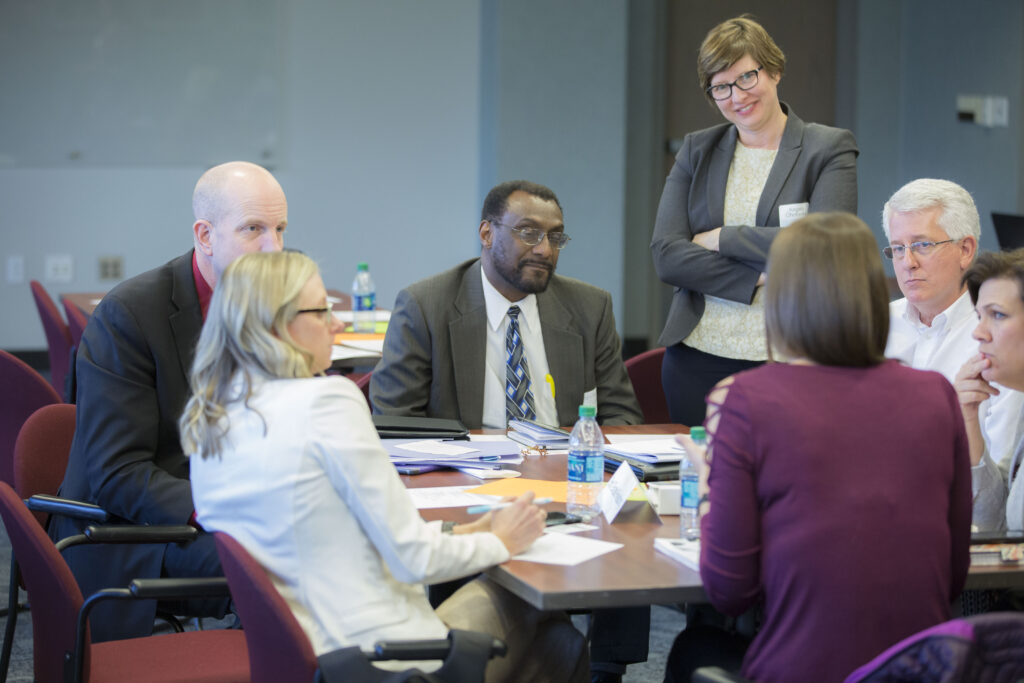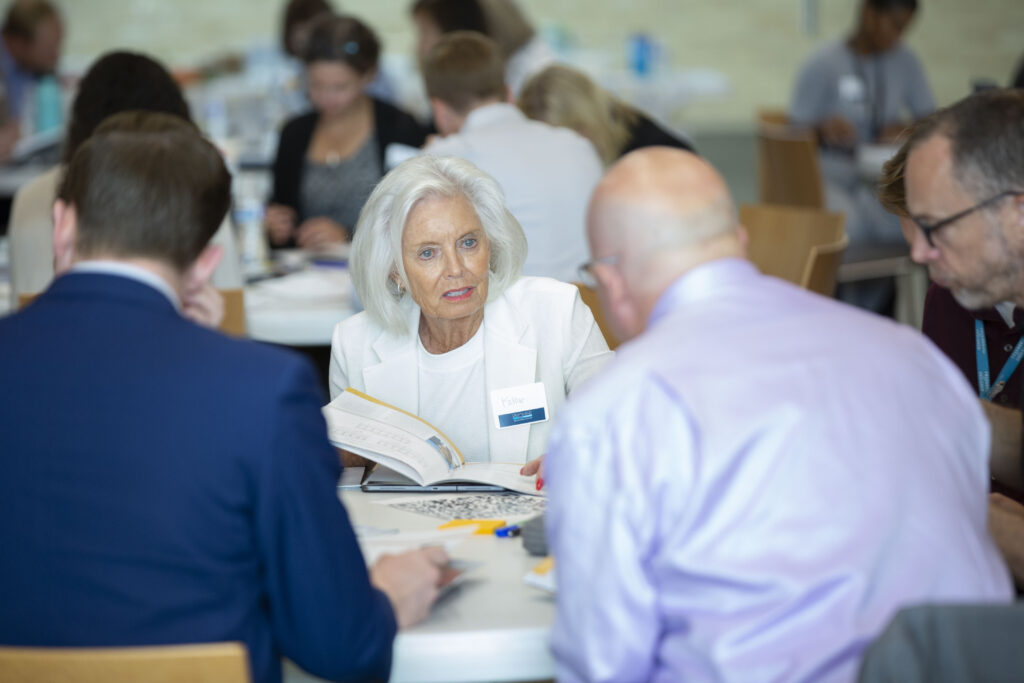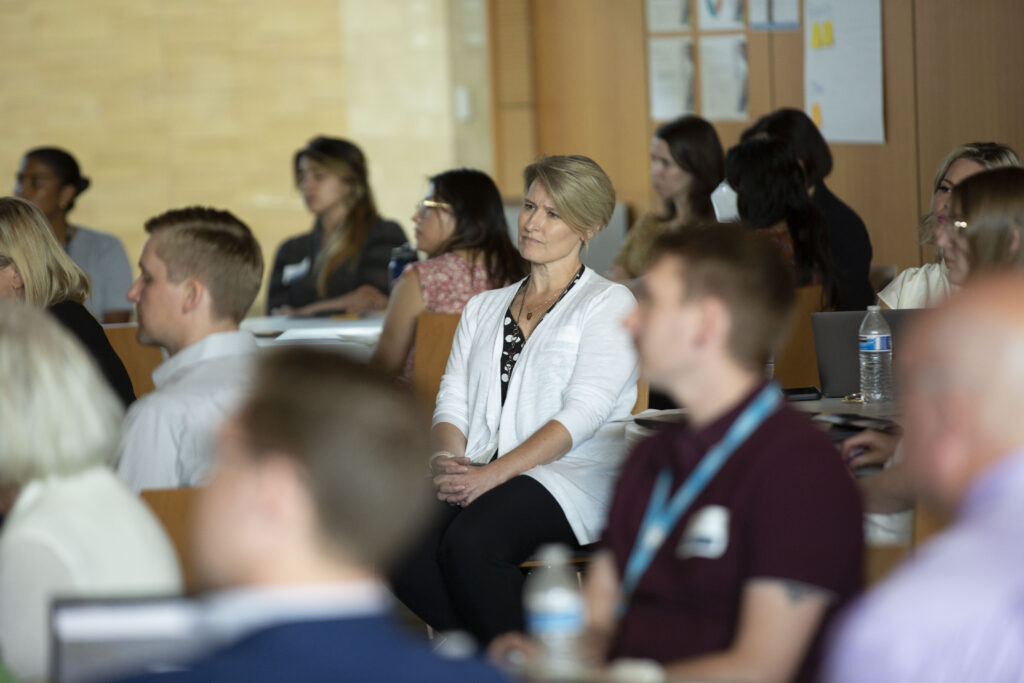Promise Partnership Council

The Promise Partnership Council (PPC) acts as the Promise Partnership's advisory board, bringing in their expertise to guide how we create systems change in our community.
The PPC is comprised of a dedicated group of youth, families, school representatives and community partners alongside some Utah's most influential systems leaders coming together to work on complex problems.
Council members come together to pursue lasting social change on some of our community’s toughest challenges by addressing systemic challenges, scaling practices that work, and leveraging its influence to create alignment and political will.



Collaborators
Collaborators are a small group comprised of 11 representatives from the PPC who review and prioritize two intersectional challenges brought from the Promise Partnership Utah data strategy review.

Accelerators
Accelerators are a small group comprised of 8-14 systems leaders from the PPC who take the barriers identified in the strategy review, narrow them down to actionable ideas, and identify who is responsible for implementation. They are assigned actionable ideas to take to networks or schools and incorporate into the work and/or adjust strategies.
Co-Chairs
Co-chairs include one individual from the Collaborators and one from the Accelerators who support meeting facilitation and preparation. Dakota Matherly and Sarah Reader currently serve as PPC co-chairs.
**PPC members who serve as Accelerators are indicated with a double asterisk by their name.
Council Members
Clearfield
Rebekah Anderson
Community Partner
Val Lopez
School Representative
Mark Shepherd
Civic Leader
Sue Caldwell
School Representative
Sarai Neumarker*
Community Leader
Kearns
Andrew Busath
School Representative
Carol Castaneda
School Representative
Lessly Paulino
Youth Community Leader
Thelma Vazquez*
Community Leader
Kelly Bush
Civic Leader
Olive Nyiramwiza
Youth Community Leader
Amy Torres
Community Partner
Midvale
Mauricio Agramont
Community Partner
Liliana Herrera
School Representative
Elena Reyes
School Representative
Rocio Gonzalez
Community Leader
David Bird*
Community Leader
Sofia Herrera
Youth Community Leader
Dustin Gettel
Civic Leader
Millcreek
Lupe Herrera
Community Leader
Jeff Silvestrini
Civic Leader
Kayla Mayers*
Community Partner
Lindsay Adams
School Representative
Ogden
Alexis Bucknam
Community Partner
Diana Lopez
Community Leader
Sarah Reader*
School Representative
Allie Johnson
School Representative
Ben Nadolski
Civic Leader
Meghan Shaw
Community Leader
Salt Lake City
Mohamed Baayd
Community Leader
Jacqui Freedman
Youth Community Leader
Jennifer Newell
Civic Leader
Tai Nguyen
Youth Community Leader
Whitney Foley
Community Leader
Sue Hall
Community Partner
Nicole Wilson*
School Representative
South Salt Lake
Anna Garcia
Community Leader
Silvia Imelda Aguero
Community Leader
Cherie Wood*
Civic Leader
April Guardado
School Representative
Edward Lopez
Community Partner
Community Schools
Susie Estrada**
System Leader
Cassy Saxton
Subject Matter Expert
Lauren Levorsen*
Community Partner
Early Childhood and Prenatal-5
William Cosgrove*
Subject Matter Expert
Carolyn Reynolds
Community Partner
Nune Phillips**
System Leader
Early Learning/Literacy
Janell Cerva*
Community Partner
Moe Hickey
Subject Matter Expert
Dakota Matherly**
System Leader
Financial Stability, Workforce, & Employment
Mallory Bateman
Subject Matter Expert
Abram Sherrod**
System Leader
Alex Ellerman
Community Partner
Health and Basic Needs
Oscar Ames
Community Partner
Alison Fleming*
Subject Matter Expert
Sandra Carpio**
System Leader
Math
Clarence Ames*
Subject Matter Expert
Lindsey Henderson
Community Partner
Molly Basham**
System Leader
Postsecondary Outcomes
Ken Perko*
Community Partner
Jason Taylor
Subject Matter Expert
Greg Peterson**
System Leader
Superintendents
Sydnee Dickson**
Superintendent
Ben Horsley**
Superintendent
Luke Rasmussen**
Superintendent
Rich Nye**
Superintendent
Elizabeth Grant**
Superintendent
Dan Linford**
Superintendent
Rick Robins**
Superintendent
Business
Charles Henderson
Business Leader
Jeff Miller
Business Leader
Jessica Purrington
Business Leader
Michael Gura
Business Leader
Collective Impact Experts
Amy Ahrens Terpstra
Collective Impact Expert
Julie Johnson**
Collective Impact Expert
Bill Crim**
Collective Impact Expert
Phillip Reese
Collective Impact Expert
Promise Partnership Council Members are affiliated with a wide range of organizations and companies across both the public and private sectors:
211 Utah
Alpine School District
Bountiful Food Pantry
Canyons School District
Clearfield City
Davis School District
Department of Health and Human Services
DHHS Office of Early Childhood
Granite Park Junior High
Granite School District
Intermountain Health
Kearns City
Kearns High
Kearns Junior High
Kem C. Gardner Policy Institute
Midtown Community Health Center
Midvale City
Midvale Community Building Community
Millcreek City
Millcreek Promise
My Hometown
OC Tanner
Ogden City
Ogden City Police Department
Ogden School District
Promise Partnership Utah
Promise South Salt Lake
Salt Lake Center for Science Education
Salt Lake City School District
Salt Lake Community College
South Salt Lake City
STEM Action Center
Tyler Library
United Way of Northern Utah
University of Utah
University of Utah Health
Utah Afterschool Network
Utah Community Action
Utah State Board of Education
Utah State University Salt Lake County
Utah's Promise
Voices for Utah Children
Weber State University
The Promise Partnership Council is NOT the Board of Directors for Promise Partnership Utah. The Board of Directors for Utah’s Promise (a 501(c)(3) organization) holds fiduciary responsibility and oversight of Promise Partnership Utah, and ensures that there are staff and resources in place to support the Partnership. Learn more here.

